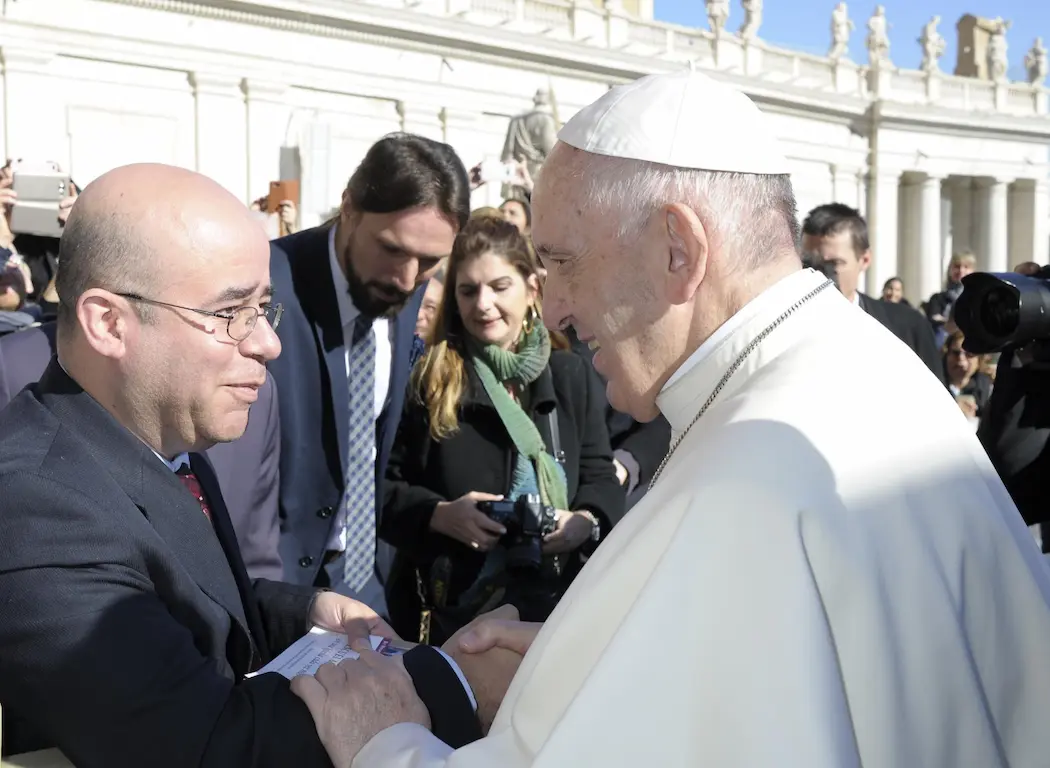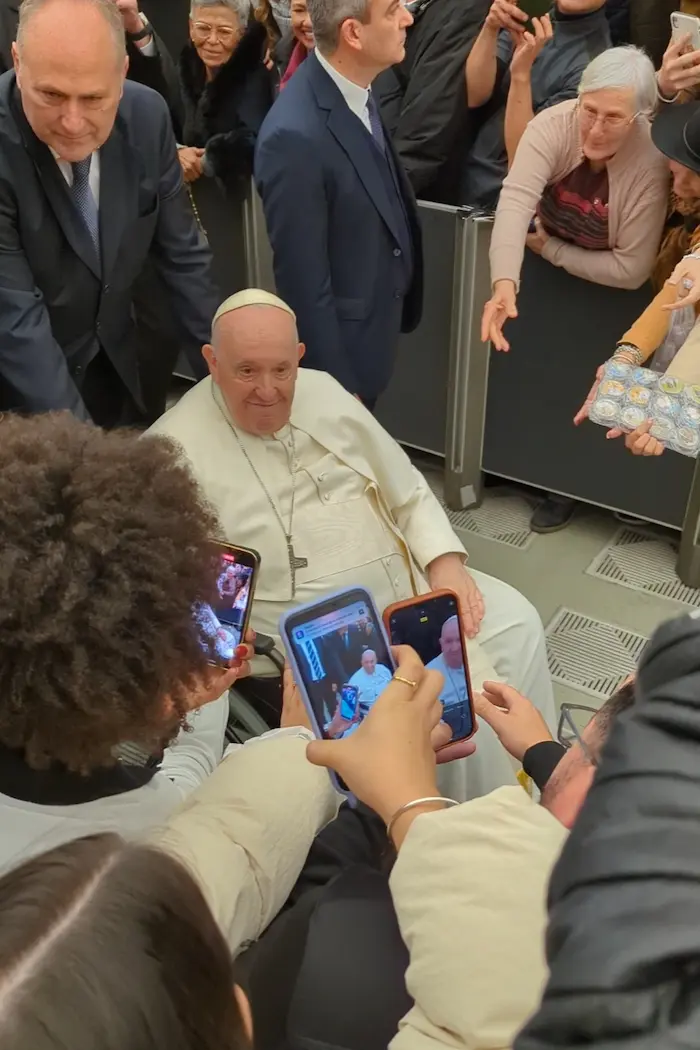During the days of mourning for Pope Francis, the CSTM community is taking time to reflect on the ways he influenced our individual lives, as well as the life of the Church. In this first post, students and faculty members share lessons they have learned from Pope Francis.

"When I first read Pope Francis’ apostolic exhortation The Joy of the Gospel (2013), its message, tone and themes rang a bell. Its language echoed strongly the concluding document that emerged from the meeting of the Latin American and Caribbean bishops in Aparecida, Brazil in 2007. By the way, he was one of the main architects of that document. It was the language with which I grew up and was formed as a young Catholic in before migrating to the United States. The Joy of the Gospel speaks about evangelization as joyful missionary discipleship grounded in the experience of being in relationship with the God of Life. It is an invitation to encounter Jesus Christ in the Scriptures, the sacraments, the created order, the church’s rich theological tradition, and others, especially the poor and those who are most vulnerable. This was Pope Francis’ programmatic exhortation, one that he witnessed in word and action throughout his 12-year pontificate. The Joy of the Gospel was everywhere: his many writings and speeches, his homilies, his messages, his gestures, his engagement with world leaders to address the questions and challenges of our time, his invitation to be truly a synodal church, and even his recommendations for ecclesial reform. Pope Francis was consistent in his commitment to being a joyful missionary disciple. I celebrate his memory and legacy by rereading The Joy of the Gospel. In doing so, my heart rejoices in a similar way it did when I read the exhortation for the first time."
-Hosffman Ospino, Professor of Hispanic Ministry and Religious Education
"From the start of his pontificate until his death, Pope Francis, Argentine Jesuit Father, smiled his way into my heart and into the hearts of the faithful, asking of us to pray for him and his work, bringing a spirit of simplicity and mercy in the manner of his namesake Francis of Assisi, and attentive especially to those who are disadvantaged by injustices and social sin. It was those injustices that occupied much of Francis’ exhortations and prayer: for the disadvantaging affects of social sin upon the people whom God has named as deserving the first fruits of the harvest, the choicest seats at the banquet, and the safe harbor of the new Jerusalem. Francis called the Church, especially during the Jubilee Year of Mercy (8 December 2015- 20 November 2016), to heal the wounds of uncertainty and pain among 'those living on the outermost fringes of society … to assuage them with the oil of consolation, to bind them with mercy, and [to] cure them with solidarity and vigilant care' (Misericordia vultus: Bull of Indiction of the Extraordinary Jubilee of Mercy, §15, April 2015)."
-Mary Jo Iozzio, Professor of Moral Theology
"I will remember the Holy Father as a pastor whose ministry embraced those at the margins and brought good news to the peripheries. A focus of Pope Francis’s style was his ability to speak to those both inside and outside the Church. Through his writings, homilies, and pastoral visits, he emphasized dialogue, encounter, and cooperation in an epoch marred by environmental degradation, violent conflict, and political turmoil. At the center of his ministry was a sense of the human family's interconnectedness, all of us sisters and brothers made in God’s image. This sense rings loud and clear in the ecumenical and interreligious focus of papal encyclicals Querida Amazonia, Laudoto Si, and Fratelli Tutti. This pastoral priority has also defined his closeness to communities affected by violence and war: Catholic and Orthodox clergy in Ukraine, his daily phone calls with the pastor of the only Catholic church in Gaza, and his meetings with Israeli families of victims and hostages of the October 7 attacks. In his friendships with Israelis and Palestinians, Ukrainians, Congolese, and Sundanese, Indigenous communities in the Amazon, and LGBTQ people and clergy abuse survivors, Pope Francis’s pastoral priorities made it clear that he took the side of humanity amid conflict, the side of compassion and closeness amid fear. Francis taught us to offer God’s own tenderness to our suffering sisters and brothers from across all our religious, national, and political divides. Above all, the Holy Father called for peace and cooperation, understanding that far from threatening the uniqueness of Christianity, reaching out across differences would advance the Gospel’s call for peace, mercy, and reconciliation in a fractured world. As the late Pope emphasized in greetings for the International Jewish Committee on Interreligious Consultations in 2014: 'Interreligious dialogue is a sign of the times… a providential sign, in the sense that God Himself, in His wise plan, has inspired, in religious leaders and in many others, the desire to encounter and come to know one another in a way respectful of religious differences.' May this legacy continue in a world in desperate need of mercy, compassion, and cooperation."
-Kyle Desrosiers-Levine, M.A.
"I have learned that it's possible to inspire others, including non-believers to have faith in Jesus. Today People from all denominations speak very warmly about the life of Pope Francis. Thank you for representing the church of Jesus Christ well."
-Juan Gomez, M.A.
"If I learned anything from Pope Francis, it's the lesson he taught us of being pastoral to those who feel outcast, forgotten about, or those who feel different. In response to this problem of a loneliness epidemic in our world, Francis always reminded us that we need to journey together in order to build up the kingdom of God. In his Apostolic Exhortation, 'Christus Vivit,' Francis expresses that 'we can move towards a participatory and co-responsible Church, one capable of appreciating its own rich variety' by being together in communion and opening up the synodal church that Francis calls us to be. In that way, no one should feel left out of the church or feel excluded. Francis did this by visiting those imprisoned. He ministered to and welcomed the LGBTQ community, giving them more of a presence in the church. And he kept the Jesuit Apostolic Preferences close to his ministry, especially walking with the excluded and journeying with the youth, showing that the care for the poor and the next generation of Catholics are meant to have a voice in our church communities."
-Brendan DeVenney, M.A. '26
"Pope Francis has deeply inspired me, and will continue to, through his bravery and rebellious spirit in challenging a world often bound by outdated traditions. He chose to speak of love when others preached punishment, becoming the first pope to take the name Francis, after Saint Francis of Assisi, the protector of the poor, the earth, and the marginalized. From the very beginning, he made it clear he would not be a pope of luxury or thrones, but one who led by example, building a humble Church rooted in compassion and service to the less fortunate. He was also the first to address the LGBTQ+ community with dignity rather than judgment, and from him I learned the power of saying, 'Who am I to judge?' a phrase that has come to symbolize his message of acceptance. As he beautifully put it, 'God does not deny His love to those who seek Him with a sincere heart.'"
-Vivian Martin, Fiscal and Events Specialist, Nuevo Momento
"For me, Pope Francis was above all a man who tried to follow Christ. Following Christ requires each follower to constantly discern what that following consists of, what the 'Christ-like' response is in a given situation. This ability was evident in all his actions, where with courage on the one hand and sensitivity on the other, he was able to take unconventional steps that he recognized as a response to the call of the Spirit of God. What I admired about him was his incredible fidelity to the voice of God, which transcended the traditionally understood boundaries of 'liberal' or 'conservative' and manifested itself in tremendous creativity. It is in this fidelity to listening to the Spirit of God and in the courage to take new decisions and new steps that I see his legacy, specifically and concretely in the synodal journey he began.
-Samuel Privara, S.T.L. '25
"Pope Francis's famous line, 'Who am I to judge?' has been important to me in my journey of accepting my LGBTQ+ identity. It can be difficult being queer and Catholic, but those words marked a shift in the way the papacy approached the LGBTQ+ community. Pope Francis's acceptance helped me to understand myself as a beloved babe of God. His views on LGBTQ+ issues may not be perfect, but he has done much to accompany queer Catholics and remind them and the Church that Jesus is deeply in love with us all."
-Shannon DeGrave, M.T.S. '26
"Like the owner of the colt on which Jesus rode to Jerusalem, we ask no questions because the time has come for the colt to rest. The Master needed him for the mission; to be a beacon of hope (Spes non Confundit), to be a bearer of peace (Fratelli Tutti), to be a joy to the wounded world (Evangelii Gaudium). He listened for (to) the voice of the Master, and when called, he did not hesitate. The Master needs him to rest now after the fatigue of his resilient mission. And now, he has come home. Untied from the burdens of office and unburdened from the weight of sorrow and sickness, he has returned to the one who called him. He fought the good fight of faith; he finished the race; he kept the faith! (bonum certamen, certavi cursum, consummavi fidem servavi) 2 Tim 4:7. Thank you, Papa Francisco, for your legendary leadership. Your unwavering commitment to humility, pastoral ingenuity, and spiritual simplicity sets a powerful example for all. Your impact is profound and truly inspiring!"
-Humphrey Okechukwu Keke, S.T.L. '26

"Pope Francis's first papal gesture was to request the entire Church to pray for him. His papacy was marked by humility and a willingness to be vulnerable before the sacredness of the people of God. His firm stance against corruption, war, and abuse of power was always accompanied by hope and joy. Pope Francis was the people's Pope. He knew that he needed God and that he needed us. In this way, he witnessed our shared need for communion. Pope Francis lived out the very nature and reality of God. God, who is always relational, to the exclusion of none. His witness of a God who is in all things and loves all people and creation has been formative in my ministerial and leadership journey within the Church over the last 10 years. I'm moved by Pope Francis's desire to live his earthly life simply, and his call to make God's love known to all ends of the earth, boldly. I pray I can do the same."
-Qwayne Guevara, M.A. ‘25


